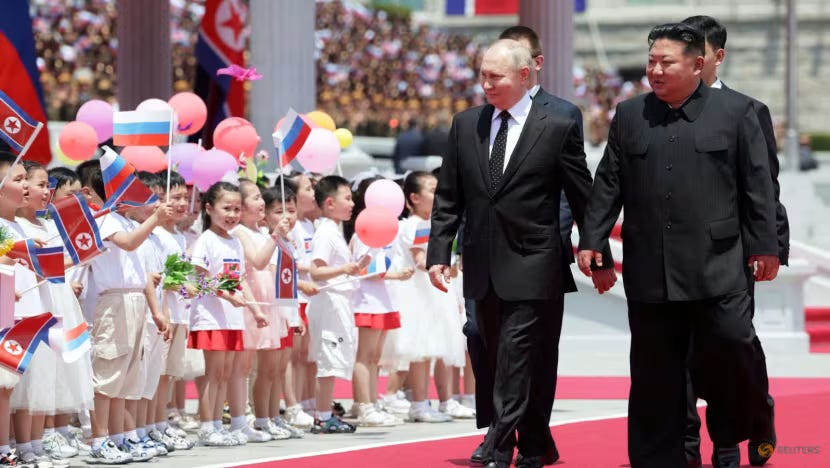New Strategic Partnership between Russia and North Korea
Putin in North Korea after 24 years. Red Carpet Welcome at Airport. Rousing Response in the Streets. The New Strategic Alliance Irks USA.
The New Strategic Partnership
The signing of a comprehensive strategic partnership agreement between Russia and North Korea today marks a significant shift in the geopolitical landscape. This alliance, formalized during Russian President Vladimir Putin's visit to Pyongyang, has far-reaching implications for regional and global stability. This piece explores the key elements of this new alliance, the concerns it raises, and its potential impact on the ongoing Russia-Ukraine conflict.
Historic Visit and Lavish Welcome
a.) Red Carpet Welcome at Pyongyang Airport
Russian President Vladimir Putin received an exceptionally warm reception during his state visit to North Korea on June 18-19, 2024. North Korean leader Kim Jong Un personally greeted Putin at Pyongyang International Airport with a warm hug and handshakes. A woman in a traditional Korean hanbok presented Putin with a bouquet of red roses as he stepped onto the red carpet, with the airport adorned with Russian flags and portraits of Putin.
b.) Pyongyang Streets Decorated to Celebrate Putin's Visit
The streets of Pyongyang were lined with huge portraits of Kim and Putin, Russian flags, and banners promoting the Russian leader and relations with Russia. This grand reception underscores the significance of Putin's visit and the strengthening alliance between the two nations.
c.) Lavish Gifts Exchanged
Putin's visit included the exchange of lavish gifts, symbolizing the deepening friendship between the leaders. Putin presented Kim with a new armored limousine, an ornate dagger, and an antique tea set.
d.) Unprecedented Access and Publicity
The extensive media coverage by North Korean state media highlights the importance Pyongyang places on its relationship with Moscow. The unprecedented access and publicity for a foreign leader's visit reflect North Korea's efforts to showcase the strength of its alliance with Russia, setting the stage for the signing of new strategic agreements to enhance economic and security cooperation.
Comprehensive Strategic Partnership Agreement
The highlight of Putin's visit was the signing of a comprehensive strategic partnership agreement. This pact elevates the relationship between Russia and North Korea to an "alliance" level, including a mutual defense clause similar to NATO's Article 5. The agreement covers cooperation in politics, trade, investment, culture, humanitarian issues, and security matters. Putin also hinted at the possibility of military-technical cooperation between the two countries.
Concerns over Military Cooperation
The new alliance has raised alarms in the United States and among its allies. There are concerns that Russia might provide advanced military technology to North Korea in exchange for weapons and munitions to support its war efforts in Ukraine. U.S. Secretary of State Antony Blinken has criticized the agreement, suggesting it reflects Russia's desperation to find allies willing to support its conflict in Ukraine. There are already allegations of North Korea supplying Russia with artillery, missiles, and shells.
Regional and Global Implications
The strengthened partnership between Russia and North Korea could destabilize the region and embolden both nations to take more provocative actions. This alliance challenges the effectiveness of international sanctions and could undermine efforts to isolate Russia economically and politically. South Korea and the United States have pledged to maintain close coordination in response to this new development, emphasizing the need to uphold UN Security Council resolutions.
China's Strategic Distance
China, an ally of both Russia and North Korea, has maintained a cautious stance on the strengthened partnership. Beijing appears to be keeping some distance to avoid further provoking the United States and the West. This strategic distance highlights the complexity of the relationships in the region and the balancing act that China must perform to maintain its geopolitical interests.
Summing Up: The Need for Peaceful Resolution
The new strategic alliance between Russia and North Korea introduces significant uncertainties into the global geopolitical equation. While it strengthens the ties between the two nations, it also poses challenges for regional stability and international security. The ongoing Russia-Ukraine war remains a critical issue that needs a peaceful resolution. Achieving peace is essential not only for the stability of Europe but also for maintaining global stability. Diplomatic efforts must continue to ensure that conflicts are resolved through peaceful means, thereby preventing further escalation and fostering a more secure world order.
If you believe this article would interest someone you know, please feel free to share it anonymously (for us), using any platform that you prefer.






